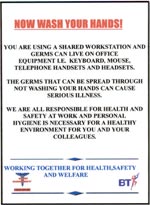In a world of common sense and based on the facts that not only the Flu virus, but also other virus including Covid-19 are airborne, you would think that wearing a facemask would not be a controversial thing to do.
But sadly we live in a world of people who prefer to dismiss what they are told and common sense, preferring to feel that if they don't believe what they re told, then it must not exist!
Despite there having been numerous studies over the last two 'Covid years' into the wearing of facemasks and the protection it can give both the wearer and those within close proximity in an enclosed space, protection and reduces the risk of airborne virus entering the lungs via the mouth and nose; a great number of the population in the UK refuses to do so.
 Furthermore, the problem is not only the public refusing to wear a facemask, but amongst those doing so too many think wearing one under their nose protects them and those around them. In reality, a baby can be potty trained in less time than the two years of Covid experience that it has taken for people still not understanding the idea of facemasks is to form a barrier between the nose and mouth and the air which is contaminated with the Covid-19 virus!
Furthermore, the problem is not only the public refusing to wear a facemask, but amongst those doing so too many think wearing one under their nose protects them and those around them. In reality, a baby can be potty trained in less time than the two years of Covid experience that it has taken for people still not understanding the idea of facemasks is to form a barrier between the nose and mouth and the air which is contaminated with the Covid-19 virus!
But it is also the problem of people not understanding that given the particle size of the Covid-19 virus, normal cloth type such as scarves, and trendy facemasks offer only minimum protection that is better than none at all. Even the surgical masks given out by private companies within the NHS and by hospitals and clinics, are also not as affective as they need to be. All in the name of saving money and by Government dictate.
It is quite clear from the numerous research studies done across the world that only facemasks to the standards of FFP2 and N95 as a minimal, can be effective in being an effective barrier to the inhalation and exhalation of virus particles in the air. They also offer good protection from such things as traffic fumes and particles and inside when working in dusty environments at home and at work.
The CWU trade union has issued a letter to all their branches from their national health & safety officer, Dave Joyce which offers detailed information of the latest research into the wearing of facemasks.
Dave writes in LTB545/21:
In a recently published research report German and US researchers found that wearing a face mask can lower the risk of catching Covid-19 by up to 225 times, compared to solely relying on a three-metre social distancing rule. This is the latest report to conclude that wearing a face covering offers 'enormously high' protection.’
In a previous study published in the British Medical Journal (BMJ), an international team of researchers found face mask wearing cut Covid-19 transmission by 53 per cent and social distancing reduced the virus spread by 25 per cent.
 The academic paper comes after a review of six real-world studies on masks, concluding that widespread face mask use can cut Covid infection rates. The latest research paper, published in the journal PNAS, measured the size and amount of respiratory particles that exhaled with various masks on.
The academic paper comes after a review of six real-world studies on masks, concluding that widespread face mask use can cut Covid infection rates. The latest research paper, published in the journal PNAS, measured the size and amount of respiratory particles that exhaled with various masks on.
It found a 90 per cent chance of catching Covid-19 if a person stands across from an infected person for five minutes and neither wear a mask, even with a gap of three metres in place.
However, it would take 30 minutes for the risk to be that high if someone was to wear a face mask, even if it does not fit ‘perfectly’ on the face. Experts from the Universities of Göttingen and Cornell who did the study said their finding “makes face masks more important than social distancing”.
This latest research paper, published in the journal PNAS (Proceedings of the National Academy of Sciences), measured the size and amount of respiratory particles that come out of people’s mouths with various masks on. Scientists calculated the risk of a person inhaling respiratory particles from various distances and lengths of exposure. The scientific researchers and authors of the latest study found that the risk of infection without wearing masks is enormously high after only a few minutes, even at a distance of three metres, if the infected persons have the high viral load of the Covid-19 virus.
Masks were last week made compulsory in England again on public transport, shops and other indoor settings in response to the new highly infectious Omicron variant, which was first identified in South Africa.
The Health and Safety Executive (HSE) state that face coverings can reduce the risk against the spread of infection because they cover the nose and mouth [if worn properly], reducing the spread of droplets and aerosols carrying Coronavirus (COVID-19).
This limits the amount of the virus being released when people talk and breathe.
Ventilation is also important!
Someone who has Coronavirus breathes out small particles (aerosols) of the virus. Adequate ventilation reduces how much virus is in the air, so it reduces the risk of breathing in the virus. In ‘stuffy’ poorly ventilated rooms the amount of virus in the air can build up, increasing the risk of spreading Covid-19, especially if there are lots of people in a crowded room. Good ventilation helps prevent the spread of Covid-19 by introducing fresh air into indoor spaces while removing stale air.
 Letting fresh air into indoor spaces can help remove air that contains virus particles and help prevent the spread of the virus. Finally, hand washing! - To prevent the spread of Covid-19, people should also regularly wash their hands with soap and water for at least 20 seconds or use a hand sanitizer when they can’t use soap and water.
Letting fresh air into indoor spaces can help remove air that contains virus particles and help prevent the spread of the virus. Finally, hand washing! - To prevent the spread of Covid-19, people should also regularly wash their hands with soap and water for at least 20 seconds or use a hand sanitizer when they can’t use soap and water.
Clean hands BEFORE and AFTER: Touching eyes, nose, or mouth, entering and leaving a public place, touching items or surfaces that are frequently touched by other people, such as doors, handles, tables, tools, equipment, trolleys etc.
Personal Hygiene To Reduce spread of germs and bugs
One of the issues that LTB545/21 does NOT cover is the risk of contamination from those with bad personal hygiene using workplace toilets and public toilets in pubs, restaurants and clubs. Scientists are fully aware that Covid-19 particle have been found in both human faeces and urine.
When you consider that research going back over 20 years has found that most office telephone handsets, keyboards and mice are contaminated due to the lack of personal hygiene by workers using such equipment; it is no surprise that the virus can easily be spread by those not washing their hands after using the toilet!
Indeed, Union Safety Reps have known this, yet in too many workplaces bad personal hygiene is tolerated, but places all at risk of contracting some pretty nasty bugs.
 Impetigo outbreak affecting several people for example within a call centre in the North West, was so bad that the local USR issued a local circular to all workers with regard to shared workstations and computer equipment reminding them of the necessity for good personal hygiene and the need to wipe down keyboards, mice and telephone handsets and headsets before using them at the beginning of their shifts. Even management agreed to the placing of hygiene notices on the back of toilet cubicle doors as a reminder to wash hands before leaving the toilets.
Impetigo outbreak affecting several people for example within a call centre in the North West, was so bad that the local USR issued a local circular to all workers with regard to shared workstations and computer equipment reminding them of the necessity for good personal hygiene and the need to wipe down keyboards, mice and telephone handsets and headsets before using them at the beginning of their shifts. Even management agreed to the placing of hygiene notices on the back of toilet cubicle doors as a reminder to wash hands before leaving the toilets.
In the 1980s local authority environmental officers took samples of peanuts from hotel bars which were often provided in small bowls at the bar or at tables for residents to eat with drinks, and examined them for the level of contamination. They found both urine and faeces in traces, but enough to cause illness. Once the word got round, the practice very quickly died out, including the practice of leaving teaspoons in the bowels so people could decanter the peanuts into their palms using the spoons. But as people didn't comply, you don't find loose peanuts being left at bars any longer.
Source: NWBTU H&S Co-ord / CWU /Gov UK / Unionsafety